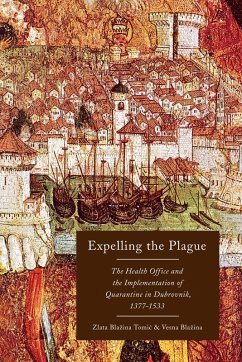A vibrant city-state on the Adriatic sea, Dubrovnik, also known as Ragusa, was a hub for the international trade between Europe and the Ottoman Empire. As a result, the city suffered frequent outbreaks of plague. Through a comprehensive analysis of these epidemics in Dubrovnik, Expelling the Plague explores the increasingly sophisticated plague control regulations that were adopted by the city and implemented by its health officials. In 1377, Dubrovnik became the first city in the world to develop and implement quarantine legislation, and in 1390 it established the earliest recorded permanent Health Office. The city's preoccupation with plague control and the powers granted to its Health Office led to a rich archival record chronicling the city's experience of plague, its attempts to safeguard public health, and the social effects of its practices of quarantine, prosecution, and punishment. These sources form the foundation of the authors' analysis, in particular the manuscript Libro deli Signori Chazamorbi, 1500-30, a rare health record of the 1526-27 calamitous plague epidemic. Teeming with real people across the spectrum, including gravediggers, laundresses, and plague survivors, it contains the testimonies collected during trial proceedings conducted by health officials against violators of public health regulations. Outlining the contributions of Dubrovnik in conceiving and establishing early public health measures in Europe, Expelling the Plague reveals how health concerns of the past greatly resemble contemporary anxieties about battling epidemics such as SARS, avian flu, and the Ebola virus.
Dieser Download kann aus rechtlichen Gründen nur mit Rechnungsadresse in A, B, BG, CY, CZ, D, DK, EW, E, FIN, F, GR, HR, H, IRL, I, LT, L, LR, M, NL, PL, P, R, S, SLO, SK ausgeliefert werden.









